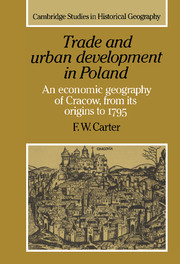Book contents
- Frontmatter
- Contents
- List of figures
- List of tables
- Preface
- Acknowledgements
- 1 Introduction: Cracow in context
- 2 Source materials and published literature
- 3 Cracow's early development
- 4 The political situation of Cracow, 1257–1500
- 5 European trade through Cracow, 1257–1500
- 6 The political situation of Cracow, 1500–1795
- 7 The commerce of Cracow, 1500–1795
- 8 Cracow: a final appraisal
- Appendix: Important dates in Cracow's history up to 1795
- Notes
- Select bibliography
- Index
- Cambridge Studies in Historical Geography
4 - The political situation of Cracow, 1257–1500
Published online by Cambridge University Press: 07 October 2009
- Frontmatter
- Contents
- List of figures
- List of tables
- Preface
- Acknowledgements
- 1 Introduction: Cracow in context
- 2 Source materials and published literature
- 3 Cracow's early development
- 4 The political situation of Cracow, 1257–1500
- 5 European trade through Cracow, 1257–1500
- 6 The political situation of Cracow, 1500–1795
- 7 The commerce of Cracow, 1500–1795
- 8 Cracow: a final appraisal
- Appendix: Important dates in Cracow's history up to 1795
- Notes
- Select bibliography
- Index
- Cambridge Studies in Historical Geography
Summary
By the mid-thirteenth century, Cracow found itself in a changing political world; the two great empires, bequeathed to Europe by the early and central Middle Ages for later times, were in disarray. The Eastern Empire, based on Constantinople, was only a shadow of its former self, whilst the Holy Roman Empire lapsed for a time after the death of Frederick II (Hofenstaufen) in 1250. In western Europe, particularly in France, England and Spain, the twelfth and thirteenth centuries had witnessed a growth of stronger royal administration and a general acceptance by the people that hereditary monarchy was an unavoidable part of political life in their lands. This belief was by no means universally accepted throughout Europe; in Scandinavia the monarchies were not powerful, whilst in eastern and central Europe, the princes were encountering resistance among their more influential subjects. Moreover, during the latter part of the Middle Ages the Poles, Hungarians and Czechs were able to develop as sovereign states, unhindered by very powerful neighbours to the east or west. Freedom from such distractions meant the rulers of Poland, Hungary and Bohemia were to become increasingly engaged in a struggle for supremacy among themselves; the prize for such efforts was a chance for unity under a powerful dynasty which alone might save it from the ambitions of German or Russian expansion.
In Poland, lack of natural protection had always laid the country open to aggressive neighbours, and forced its medieval rulers to watch carefully the vicissitudes of political units along its eastern and western borders.
- Type
- Chapter
- Information
- Trade and Urban Development in PolandAn Economic Geography of Cracow, from its Origins to 1795, pp. 63 - 86Publisher: Cambridge University PressPrint publication year: 1994



